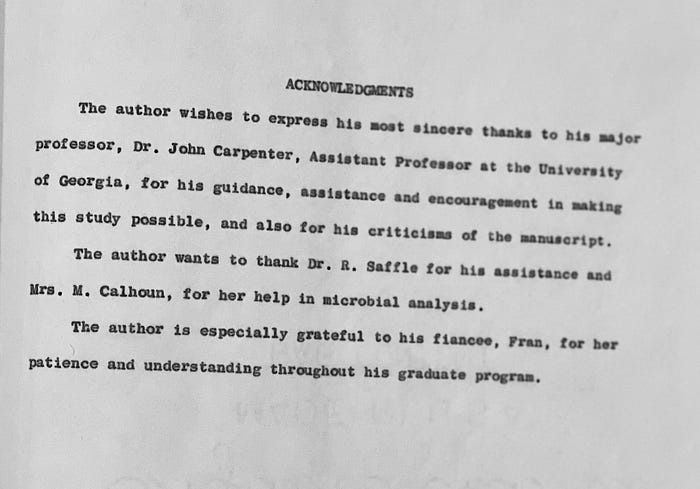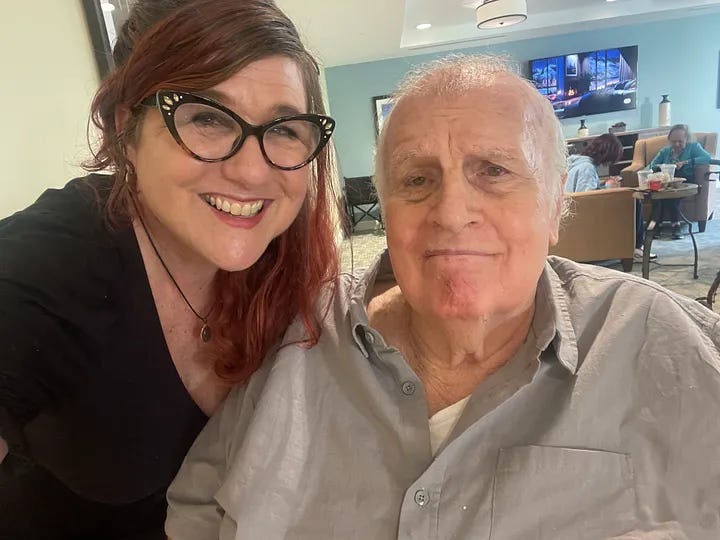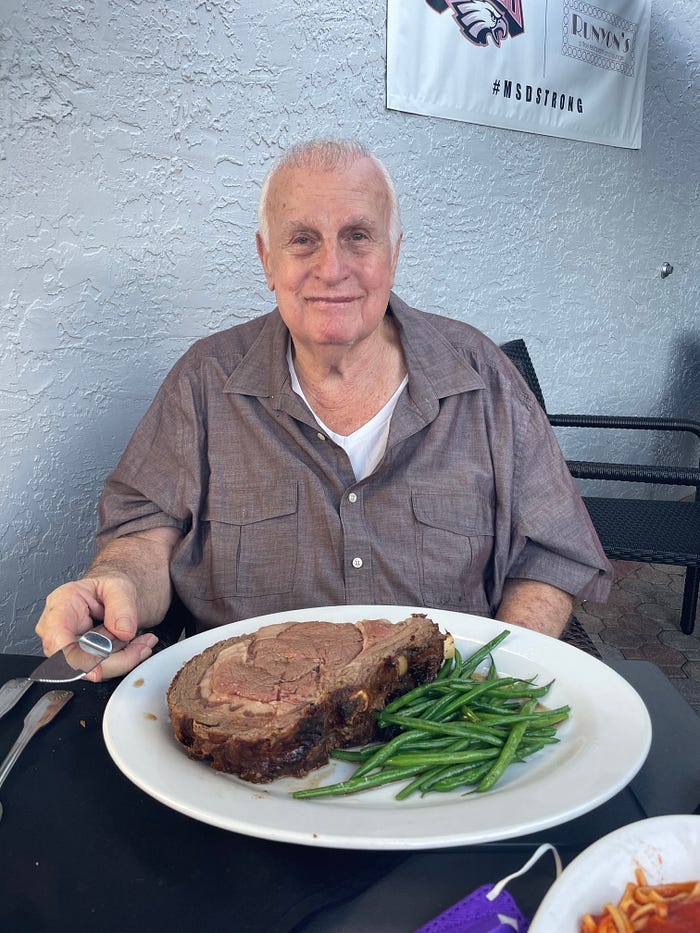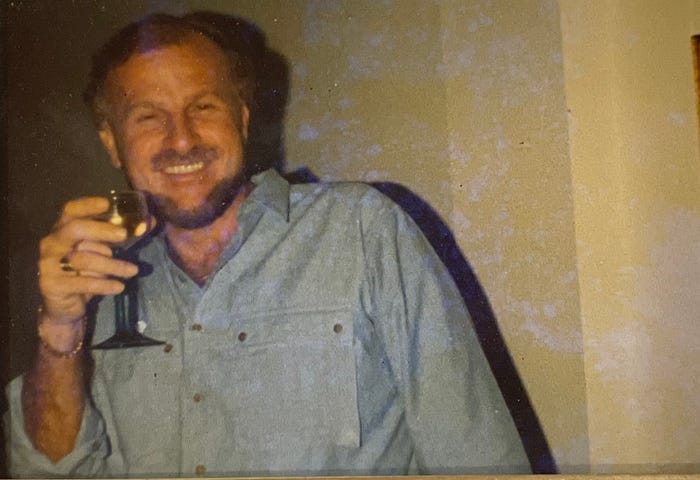Happy Father’s Day to My Dad, Who Has No Idea What Day It Is
My father is much more likeable now that he has dementia.
Every childhood friend of mine is terrified of my Dad, to this day.
Standing over six feet tall and barrel-chested — and as verbally aggressive as any type-A Boomer from the Bronx could be — my Dad reigned over my childhood home, a tyrant in his own domain.
A classic (though not isolated) example: my tenth birthday party. I had a gaggle of girls for a sleepover. We stayed up late, eating snacks, telling ghost stories, and holding seances (“light as a feather, stiff as a board”), undoubtedly giggling up a storm.
I mean, we were ten.
In burst my Dad sometime after midnight, dressed only in his tighty-whities, thick hairs coating his chest and belly and his comb-over bedhead flapping to and fro. And he YELLED. AT. US. After all these years, I don’t recall the words he yelled. I just remember he was loud, so loud, even as he was yelling at us for being loud.
Ten was too young to understand irony.
Ten was old enough to understand humiliation, sort of. It’s hard to recall how an emotion felt, decades later, without layering in how my adult self now perceives it.
Ten was too young to expect quiet during a birthday sleepover.
When he finished his tirade, he separated us into different rooms to quell any potential sleepover uprisings, and made it clear he didn’t want to hear another peep.
I did not peep.
Not then. Not after the party. Not till now.
I don’t think my friends did either. We never discussed it.
Happy tenth birthday to me.
Much of my childhood passed like this, with his heavy, explosive presence cast over our home. My Mom was passive-aggressive, meek in his shadow, and my brother and I simply ducked.
By my junior year in high school, Mom finally had enough. She filed for divorce, and he moved out.
I have vague memories from this era. I remember my Dad phoning me drunk from bars. I seem to recall watching him retch in the toilet, wasted and weeping to me, pathetic, about the demise of his marriage. My Mom has spoken in recent years of the awful things my Dad said about her to my brother and me as their marriage devolved; I have no recollection of this at all, nor of the subsequent therapy sessions she took us too. I only know it happened because I believe my Mom as a reliable narrator of our stories.
It’s shocking to me how I repressed the moments even before they became memories, and now as memories how I can barely recall if they’re real. Did these things happen once? Occasionally? Often? Did I ever tell my friends or my mom? I don’t think I did.
You know how your prefrontal cortex isn’t fully developed until age 25? It must be true, because adult me can’t even detect a hint of myself in my non-reaction to all these unacceptable experiences. They just… were.
After he moved out there were the dreaded, obligatory Sunday visits. He’d pick me up in his Porsche, which he could never properly drive — each gear shift grinding and the car lurching with his inept transitions — and take me to iHop for Sad Dad brunch. Boysenberry syrup and awkward conversation.
Afterwards we’d head to his apartment and he’d watch sports on TV, the drone of sportscasters an incessant soundtrack to my childhood. I remember the photos he’d taped all over the walls, of his Porsche and also of loads of women, young women, most barely older than I was. He was so proud of those photos. “They’re pretty, aren’t they?” he’d ask me.
I think I nodded? What else could I do.
I may have been young and emotionally stunted, but I did know how lamentable he was — and how uncomfortable I felt around him.
Now, my Dad wasn’t a monster. He had his moments of levity, and a bellowing belly laugh that accompanied them. He grew up without privilege. His father, a taxi driver in New York, was bipolar. His mother died young, when he was about 16. A self-made businessman, he was the first in his family to graduate both from college and a master’s program. (I was the second; he was proud of that.) When I cleaned out his home last year I found a copy of his master’s thesis, hand-typed in 1967, “A Study of Salmonellae In Meat and Meat Products.”
The acknowledgement page is pretty sweet.

He worked hard and provided for us. He did his best, within the limited emotional tools he had. I resigned myself to this limited sense of gratitude and affection for him shortly after he and then I left my childhood home. I mostly forgave his misdoings, or at least, I tucked them aside.
But one thing I knew then and still can remember now: the house — and my day-to-day life — felt so much lighter without his anger in it.
My Dad was never entirely gone from my life — though I did consider that option in early adulthood. Ultimately, I decided space, distance, and benign neglect were the best path forward.
He remarried when I was 19, already away at college. He and his wife were perfectly miserable together for decades. I limited our calls to monthly and our visits, biannually (and I do mean every two years, not twice per year). During election cycles, I made even less frequent contact as they were — and if he were cogent and she were alive, still would be — rabid Trump supporters.
We lived on the opposite ends of the country. I accepted his limitations as a father, and for years we maintained a superficial connection. I established boundaries, and he respected them — or more likely, he was absorbed in his own life enough to not need anything more from me.
His wife took care of his needs, and bore the brunt of his verbal abuse.
As his only daughter, I never wanted either of those burdens falling to me.
So, it all worked well.
Until his mental status, and his wife’s health, both started to deteriorate.
Then things worked, though not quite-so-well.
But I noticed something else…
During our infrequent calls, I could see the gaps in his memory. He’d repeat himself. He’d space out.
I also noticed he didn’t sound angry or aggressive anymore. He sounded grateful to hear from me. I noticed new characteristics had emerged: timidity, insecurity, worry.
I flew out to check on him in early 2022. I’d promised to take him to his favorite steakhouse with my kids. He could barely navigate the path to the car with his rollator, and he was so anxious. He sat in the front seat of the car, panicked. “Where’s my wife??” he asked, over and over. “Is she mad? Did I do something wrong?”
It took constant reassurance — and the promise of prime rib — to calm him enough to get to the restaurant. He asked to call his wife every minute or so for most of the meal.
This was a side to my Dad I’d never seen. I’d learned how to manage his verbal abuse, his oppressive moods. I was a bit at a loss how to manage a fretful father.
Looking to distract him, I pointed out the song playing, asked if recognized it. He fumbled through the lyrics, and even as he couldn’t recall the name of the artist or song he wept as he claimed he loved it. I’ll never forget his expression — or the looks I exchanged with my daughters—as he sort of sang along with the lyrics of Elton John, tears streaming down his face.
I sang along to help him out.
The words she knows, the tune he hums.
This formerly angry, explosive man — who’d oppressed and silenced me throughout my childhood — was a wounded, fragile husk, a tiny dancer in my hand.
At least, until the prime rib showed up…
I left that visit with more empathy for my Dad than I thought possible.
I also left with trepidations for how he and his wife would manage.
But I returned home, knowing his wife’s aides would help him out a bit, and hoping they could sustain themselves without needing intervention for awhile longer. I continued to keep my distance, physically and emotionally.
Until I couldn’t.
A few months later — on June 20, 2022 — his wife passed.
And it all fell to me.
I flew back to Florida and made it to the funeral on about an hour’s sleep. My Dad was distraught. He had COVID. And he had no plan. I sat behind him and held onto his shoulders, double-masked, while he wailed in grief, hoping I was outside his spittle radius.
Then came the hardest part — what happened next.
My Dad and his wife had lived in that house for over 30 years, had barely left it for years. It was in as much disrepair as he was. They had a blind, diabetic, incontinent, fractious 12-year-old dog who also never left. Everything about the home and its remaining occupants was stagnant.
And it was my job to uproot it all, in about a week.
The burden I never wanted.
The days passed in a whirlwind of memory care facility tours, tax forms, estate plans, home repairs, phone calls, medical forms, furniture shopping, all while trying to re-home the dog, prepare his new home, and finally — figure out how to get him actually into the building.
I knew he wouldn’t come willingly.
His nurse Rachael and I made a plan to take him there for lunch. Dad is highly food motivated, so he eagerly agreed.
I was terrified of what would happen once he realized he was never going to leave.
Then as we sat in the memory care unit, him happily eating his way through multiple tuna melts, the most amazing thing happened.
He looked around and said, this place is nice.
He stopped a few people walking by in the hallway and asked, hey, do you like living here? Is the food good?
The residents were gracious. He turned to Rachael and me and said, you know, I don’t think my wife is going to make it. If she dies, do you think I could live here?
Rachael and I exchanged looks, astonished. She answered, I’m sure you could. She then turned to the nurse on duty and said, do you have a room this gentleman could see? He’s interested in living here.
The nurse played along. Of course, she said. Go see room 132.
The brain is a wild ride, the convolutions it will take when integrating a new reality over an old one.
We helped my Dad walk down the hall, to his room. I’d painstakingly arranged it to look welcoming, with all new bedding, and a fancy TV, and loads of family photos. I couldn’t believe how perfectly the admission day was progressing so far.
Then he walked into the room, took one look at it — and completely lost his mind.
Turns out, I’m still terrified of the way my Dad yells, to this day.
Somehow, once my Dad realized the room was for him, his brain took another wild pivot, this time into terror, and his anger returned with a vengeance.
He unleashed a string of obscenities like I’ve never heard.
And he YELLED. THEM. AT. ME.
“I HATE THIS F*CKING PLACE! YOU’RE MY DAUGHTER!! I ORDER YOU TO DO WHAT I SAY! GET ME OUTTA THIS F*CKING PLACE!!!!!!”
And finally, “I HATE YOU!!”
Suddenly I’m ten years old again and my Dad is angry and he’s yelling at me.
Only this time, he can’t send me to my room and take me away from my friends. I’m sending him to his room, and I’ve taken him away from his home, his dog, his life.
I might be the one in control this time, but also, I’m walloped by the enormity of the decision I’ve made for him. And no one has yelled at me like this in decades, since my childhood, and only he has done it, ever.
I freeze.
Rachael intervenes and tells me to step outside the room.
“GET ME OUT OF THIS F*CKING PLACE! I WILL HIT YOU!!!” I hear him yell at Rachael.
“No, you won’t,” she tells him. She’s petite but she’s mighty, and she gets right in his face without fear. “You won’t hit me because that’s not the man you are. Now stop yelling and sit down,” she tells him.
She turns and tells me to wait outside.
I leave, my Dad’s obscenities blazing in my ears as I head to the exit.
I wish it were different.
I wish I had the kind of Dad I could welcome into my home, someone I could care for in his final years.
But that’s not the Dad I have.
I can care for him by ensuring he’s in a good place. But as ever, my relationship with him needs boundaries, with space, distance, and benign neglect as our best path forward.
I sit outside the memory care and sob as I wait for Rachael.
When she comes out she asks me, “Did you know your grandmother?”
“No, she died long before I was born,” I answer.
“Well, she definitely verbally abused him,” she said. “Did you see the way he cowered when I stood up to him and raised my voice? He was abused. I feel certain of it.”
And with that, I finally understand why my Dad spent so much of his life angry and yelling.
The beauty of memory loss is it forgives all transgressions.
My Dad has no memory of that day. He’s content, living in his memory care facility. He’s an ace at morning trivia and bingo, and has lots of old lady friends who dote on him.
He sounds happy when I call, though he has no idea how to carry a conversation. He asks every time we talk when I will come visit him next, but has no idea how to interact with me or my kids when we’re there.
He’s losing some function, the usual indignities of aging — especially for one who’s not cared well for his body and mind.
He’s still a bit anxious, though far less so. Medication is helping. And the anger that characterized most of his adult life has greatly diminished, nearly gone.
He’s so much more likeable, now that he’s lost it.
I’m sad for what he’s lost — his mobility, his memory, his wife, his home.
But I’m sadder still for the emotional work he never did, the demons he never confronted, the person he could have grown to be if he’d learned to process it all and manage his anger.
I’m sad for the kind, wise Dad I never had, but always wish I did.
Father’s Day is a tough one, because my Dad has been and still is a challenging relationship for me. I’m grateful for the connection we’ve maintained. I know he loves me, and in my own avoidant attachment way, I love him as well.
I’m happy he’s in a place that can care for him, in a way I can’t.
And I hope he has a happy Father’s Day.
I’ll be sure to call Sunday and wish him one personally — even though I know he won’t know what day it is.
PS — If you want to find out what happened to Woody, my Dad’s dog, here’s the link with his story.
(Spoiler, it’s a happy one.)
Greetings!
I’m Dana DuBois, a GenX word nerd living in the Pacific Northwest with a whole lot of little words to share. I’m a founder and editor of three publications: Pink Hair & Pronouns, Three Imaginary Girls, and genXy. I write across a variety of topics but parenting, music and pop culture, relationships, and feminism are my favorites. Em-dashes, Oxford commas, and well-placed semi-colons make my heart happy.
If this story resonated with you, why not buy me a coffee?
(Make mine an iced oat milk decaf mocha, please and thank you.)






I can't imagine going through this with my parents.
I can relate to parts of this, with my dad yelling and acting not so lovingly towards me. I'm fortunate he didn't drink, because I'm sure it would've been much worse. I hope you have other familial support.
Beautifully written. My heart goes out to you. I had the kind of dad who hid behind the newspaper when he got home from work. Our mother raised my brothers and me. So 5 years ago, when my dad could no longer live by himself in his little house in the woods, I brought him to live with me. He did not have memory issues, but it was an adjustment for both of us. My parents retired and moved a thousand miles away a couple of years after I graduated from high school. My mother had died in 2004, so he'd been alone for quite a while. And we hadn't lived in the same house in 35 years.
I cared for him for the last 10 months of his life, and when he did go, he was in my living room in a hospital bed, and I was holding his hand. A friend I will be grateful to forever was sitting there with us so that I didn't have to watch him go alone.
The other thing that struck me about your writing is how much we understand about our parents after it's too late for us to do anything about it. I hope that whatever time you have left with your dad, you will be able to heal some of the breaches. I wish that for you very much.